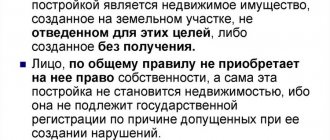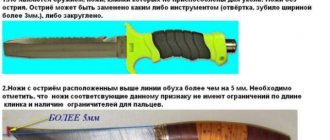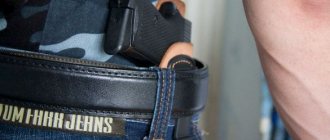ST 222 of the Criminal Code of the Russian Federation.
1. Illegal acquisition, transfer, sale, storage, transportation or carrying of firearms, their main parts, ammunition (with the exception of civilian smooth-bore long-barreled weapons, their main parts and cartridges for them, limited-kill firearms, their main parts and cartridges for him) -
shall be punishable by restriction of liberty for a term of up to three years, or forced labor for a term of up to four years, or arrest for a term of up to six months, or imprisonment for a term of up to four years with a fine in the amount of up to eighty thousand rubles or in the amount of wages or other income convicted for a period of up to three months or without it.
2. The same acts committed by a group of persons by prior conspiracy, -
shall be punishable by imprisonment for a term of two to six years with or without a fine in the amount of up to one hundred thousand rubles or in the amount of the wages or other income of the convicted person for a period of up to six months.
3. Acts provided for in parts one or two of this article, committed by an organized group, -
shall be punishable by imprisonment for a term of five to eight years with a fine in the amount of one hundred thousand to two hundred thousand rubles or in the amount of the wages or other income of the convicted person for a period of one year to eighteen months, or without it.
4. Illegal sale of civilian firearms smooth-bore long-barreled weapons, firearms of limited destruction, gas weapons, edged weapons, including throwing weapons, -
shall be punishable by compulsory labor for a term of up to four hundred eighty hours, or correctional labor for a term of one to two years, or restriction of freedom for a term of up to two years, or forced labor for a term of up to two years, or arrest for a term of three to six months, or imprisonment for a term of up to two years with or without a fine in the amount of up to eighty thousand rubles or in the amount of the wages or other income of the convicted person for a period of up to six months.
Note
. A person who voluntarily surrenders the items specified in this article is exempt from criminal liability under this article. Their seizure during the detention of a person, as well as during investigative actions to detect and seize them, cannot be recognized as voluntary surrender of the items specified in this article, as well as in Articles 222.1, 223 and 223.1 of this Code.
Commentary to Art. 222 of the Criminal Code
1. The subject of the crime in relation to Parts 1 - 3 is a firearm, its main parts, ammunition (with the exceptions specified in the disposition of the article), and in relation to Part 4 - civil firearms smooth-bore long-barreled weapons, firearms of limited destruction, gas and cold steel (including throwing) weapons (clauses 2 - 7, 9 - 10 of the Resolution of the Plenum of the Supreme Court of the Russian Federation of March 12, 2002 N 5 “On judicial practice in cases of theft, extortion and illegal trafficking of weapons, ammunition, explosives and explosive devices"). In this case, the subject of the crime is not only a weapon suitable for functional use, but also a faulty or training weapon, if it contained components suitable for use or if a person had the goal of bringing it into a suitable condition and took any actions to realize this intention.
2. From the point of view of the objective side of Art. 222 of the Criminal Code of the Russian Federation provides for two independent elements of crime.
The first of them (part 1) is characterized by alternatively provided actions in relation to the subject of the crime: a) acquisition; b) transfer; c) sales; d) storage; e) transportation; e) wearing. The content of the listed actions is disclosed in paragraph 11 of the Resolution of the Plenum of the Supreme Court of the Russian Federation dated March 12, 2002 No. 5.
3. Actions must be illegal, i.e. be carried out in violation of the rules for the circulation of relevant items established by law.
4. The second corpus delicti (Part 4) is described in the law as an action in the form of illegal sale of weapons specified in the disposition.
5. Note to Art. 222 of the Criminal Code of the Russian Federation provides the basis for exemption from criminal liability in connection with active repentance.
Criminal Code of the Russian Federation: Article 222.2
#Lbl2222
The Code was supplemented by Article 222.2 from July 12, 2021 - Federal Law of July 1, 2021 No. 281-FZ
Article 222.2.
Illegal acquisition, transfer, sale, storage, transportation, forwarding or carrying of large-caliber firearms, their main parts and ammunition
#Lbl22221
1. Illegal acquisition, transfer, storage, transportation, forwarding or carrying of large-caliber firearms, their main parts and ammunition to him -
#Lbl222212 shall be punishable by forced labor for a term of up to five years, or by imprisonment for a term of three to six years, with or without a fine in the amount of up to two hundred thousand rubles or in the amount of the wages or other income of the convicted person for a period of up to one year.
#Lbl22222
2. Illegal sale of large-caliber firearms, their main parts and ammunition -
#Lbl222222 shall be punishable by imprisonment for a term of seven to ten years with a fine in the amount of two hundred thousand to three hundred thousand rubles or in the amount of the wages or other income of the convicted person for a period of six months to one year, or without it.
#Lbl22223
3. The acts provided for in part one of this article, committed:
#Lbl222231a) by a group of persons by prior conspiracy;
#Lbl222232b) by a person using his official position;
#Lbl222233c) using information and telecommunication networks, including the Internet, -
#Lbl2222032 shall be punishable by imprisonment for a term of eight to ten years with a fine in the amount of three hundred thousand to five hundred thousand rubles or in the amount of the wages or other income of the convicted person for a period of one year to eighteen months, or without it.
#Lbl22224
4. Acts provided for in the first part of this article, committed by an organized group, -
#Lbl222242 shall be punishable by imprisonment for a term of ten to twelve years with a fine in the amount of five hundred thousand to eight hundred thousand rubles or in the amount of the wages or other income of the convicted person for a period of one to three years, or without it.
#Lbl22225
5. The act provided for in part two of this article, committed:
#Lbl222251a) by a group of persons by prior conspiracy;
#Lbl222252b) by a person using his official position;
#Lbl222253c) using information and telecommunication networks, including the Internet, -
#Lbl2222052 shall be punishable by imprisonment for a term of ten to twelve years with a fine in the amount of five hundred thousand to eight hundred thousand rubles or in the amount of the wages or other income of the convicted person for a period of one to three years, or without it.
#Lbl22226
6. An act provided for in part two of this article, committed by an organized group, -
#Lbl222262 shall be punishable by imprisonment for a term of twelve to fifteen years with a fine in the amount of five hundred thousand to one million rubles or in the amount of the wages or other income of the convicted person for a period of two to four years, or without it.
#Lbl222210 Notes.
1. A person who voluntarily surrendered the items specified in this article is exempt from criminal liability under this article.
#Lbl22221022. For the purposes of this article and other articles of this Code, large-caliber firearms mean firearms (with the exception of civilian firearms and service firearms) with a caliber of 20 mm or more.
Second commentary to Art. 222 of the Criminal Code of the Russian Federation
1. The subject of the crime provided for in Part 1 of Art. 222, - firearms, their main parts, ammunition (with the exception of civilian smooth-bore long-barreled weapons, their main parts and cartridges for them, limited-kill firearms, their main parts and cartridges for them).
Smooth-bore weapons, pneumatic weapons, signal, starting, construction and installation pistols and revolvers are not included in the subject of the crime (Part 1 of Article 222).
A faulty or training firearm can only be recognized as the subject of this crime when the perpetrator had the intention and real opportunity to bring it into a condition suitable for shooting or contained usable components.
2. The objective side is characterized by the commission of at least one of the illegal actions listed in Part 1 of Art. 222.
The acquisition of these items means receiving them into permanent or temporary possession by any means. Transfer means their temporary assignment to other persons who do not own the named items. The sale of these items should be understood as their irrevocable (as opposed to illegal transfer) alienation into the ownership of other persons as a result of any illegal transaction (compensated or gratuitous), i.e. sale, donation, exchange, etc. Storage means actual possession of them, regardless of the specific location (in a home, outbuildings, in a special hiding place, etc.). Transportation refers to the actions of moving these items, regardless of the method of transportation, but not directly in front of the accused. Carrying occurs in cases where the perpetrator secretly or openly keeps them with him, i.e. in clothes or directly on the body of the accused, as well as carrying them in a bag, briefcase, etc.
Listed in Part 1 of Art. 222 actions are considered illegal if they are committed in violation of the rules for the circulation of weapons, ammunition, explosives, explosive devices established in regulations.
The crime is completed from the moment of committing any of the actions specified in the law.
3. The subjective side is characterized by direct intent.
4. The subject of the crime is a person who has reached the age of 16 years.
5. In part 2 of Art. 222 establishes liability for an act committed by a group of persons by prior conspiracy, and in Part 3 of Art. 222 - by an organized group.
6. In accordance with Part 4 of Art. 222 of the Criminal Code punishes the illegal sale of civilian smooth-bore long-barreled weapons, weapons, firearms of limited destruction, gas weapons, edged weapons, including throwing weapons.
To purchase and store gas weapons in the form of pistols and revolvers, you must obtain a license. Mechanical sprayers, aerosols and other devices filled with tear and irritant substances are also classified as gas weapons, but can be purchased freely. In Russia, the circulation of any gas weapons equipped with nerve agents, poisonous or other substances that can cause harm to health is prohibited.
7. In accordance with the note to Art. 222, a person who voluntarily surrendered the subject of a crime is exempt from criminal liability if his actions do not contain another crime.
Their seizure during the detention of a person, as well as during investigative actions to detect and seize them, cannot be recognized as voluntary surrender.
In cases where an administrative offense committed by a person (for example, violation of the rules for storing or carrying weapons and ammunition, their sales, untimely registration and re-registration of weapons, etc.) also contains signs of a criminal offense, the specified person can only be brought to administrative liability .
Commentary on Article 222 of the Criminal Code of the Russian Federation
1. The subject of the crime is firearms, their main parts, ammunition, explosives and explosive devices. It does not include pneumatic weapons, signal, starting, construction and installation pistols and revolvers.
A firearm is a weapon designed to mechanically destroy a target at a distance with a projectile that receives directional movement due to the energy of a powder or other charge.
The main parts of a firearm: barrel, bolt, drum, frame, receiver.
Ammunition - weapons and projectile equipment intended to hit a target and containing an explosive, propelling or expelling charge or a combination thereof.
2. On the concept of explosives, see the commentary to Art. 218 CC. Explosive devices are industrial or home-made products that functionally combine an explosive substance and a device for initiating an explosion (fuse, fuse, detonator, etc.).
3. A faulty or training firearm can only be recognized as the subject of a crime when the perpetrator had the intention and real opportunity to bring it into a condition suitable for shooting or it contained components suitable for use.
4. The acquisition of items specified in the law means receiving them into permanent or temporary possession by any means.
Transfer means their temporary assignment to other persons who do not own them.
Sales should be understood as their irrevocable (as opposed to illegal transfer) alienation into the ownership of other persons as a result of any illegal transaction (paid or gratuitous).
Storage means actual possession of them, regardless of the specific location (in a home, outbuildings, special hiding place, etc.); transportation - actions to move these items, regardless of the method of transportation, but not directly in front of the accused.
Carrying occurs in cases where the perpetrator secretly or openly keeps them with him, i.e. in clothes, bag, briefcase, etc.
5. Listed in Part 1 of Art. 222 actions are considered illegal if they are committed in violation of the rules for the circulation of weapons, ammunition, explosives, explosive devices established in regulations.
6. The crime is completed from the moment of commission of any of the actions specified in the law.
7. The subjective side of the crime is characterized by direct intent.
8. The subject of the crime is a sane person who has reached the age of 16 years.
9. In accordance with Part 4 of Art. 222 criminalizes the illegal sale of civilian firearms, smooth-bore long-barreled weapons, firearms of limited destruction, gas weapons, edged weapons, including throwing weapons.
Firearms of limited destruction are short-barreled and barrelless weapons intended for mechanical destruction of a living target at a distance by the throwing equipment of a traumatic cartridge, receiving directed movement due to the energy of a powder or other charge, and not intended to cause death to a person.
Gas means a weapon designed to temporarily destroy a target, which can be a person or animal, by using toxic substances that have a tear-producing, irritating or other effect. To purchase and store it, you must obtain a license.
Mechanical sprayers, aerosols and other devices filled with tear and irritant substances are also classified as gas weapons, but can be purchased freely. In Russia, the circulation of any gas weapons equipped with nerve agents, poisonous or other substances that can cause harm to health is prohibited.
10. Melee weapons are:
- objects intended to defeat a target using human muscular power in direct contact with the target, which include bladed weapons, other weapons of cutting, piercing, chopping or mixed action, as well as weapons of impact-crushing action (brass knuckles, nunchucks, flails, etc.);
- objects intended to hit a target at a distance with a projectile that receives directed movement using human muscular power (throwing knives and axes, darts, etc.) or a mechanical device (bows, crossbows, etc.).
11. The note to the commented article provides for a special type of exemption from criminal liability.
Judicial practice: sentences and punishment under Art. 222 of the Criminal Code of the Russian Federation
- Decision of the Supreme Court: Determination No. 3-APU17-5 dated... THE SUPREME COURT OF THE RUSSIAN FEDERATION Case No. 3-APU 17-5 APPEAL DECISION Moscow August 24, 2021 Judicial Collegium for Criminal Cases...
- Decision of the Supreme Court: Determination N 203-APU17-21... THE SUPREME COURT OF THE RUSSIAN FEDERATION Case No. 203-APU17-21 APPEAL DECISION Moscow August 31, 2021 Judicial Collegium for Military Personnel of the Supreme...
- Judicial Collegium for Criminal Cases, appeal:... THE SUPREME COURT OF THE RUSSIAN FEDERATION Case No. 72-APU 17-21 APPEAL DECISION Moscow October 04, 2021 Judicial Collegium for Criminal Cases...
- Resolution of the Presidium of the Supreme Court of the Russian Federation dated... PRESIDIUM OF THE SUPREME COURT OF THE RUSSIAN FEDERATION DECISION dated January 18, 2017 N 194-P16 ON RESUMING CRIMINAL PROCEEDINGS IN VIEW OF...
- Appeal ruling of the Supreme Court of the Russian Federation dated... SUPREME COURT OF THE RUSSIAN FEDERATION APPEAL DECISION dated October 3, 2021 N 4-АPU18-32SP Judicial Collegium for Criminal Cases of the Supreme Court...
- Decision of the Supreme Court: Determination N 45-АПУ17-6П... THE SUPREME COURT OF THE RUSSIAN FEDERATION Case No. 45-АПУ17-6з APPEAL DETERMINATION Gor. Moscow May 11, 2021 Judicial Collegium for Criminal Cases...
- “Review of judicial practice of exemption from criminal... REVIEW OF JUDICIAL PRACTICE OF EXEMPTION FROM CRIMINAL LIABILITY WITH ASSIGNMENT OF A COURT FINE (ARTICLE 76.2 of the Criminal Code of the Russian Federation) Federal Law of July 3...
- Resolution of the Plenum of the Supreme Court of the Russian Federation dated... PLENARY OF THE SUPREME COURT OF THE RUSSIAN FEDERATION DECISION dated December 27, 2002 N 29 ON JUDICIAL PRACTICE IN CASES OF THEFT,...
- Decision of the Supreme Court: Determination No. 67-АПУ17-9 dated... THE SUPREME COURT OF THE RUSSIAN FEDERATION Case No. 67-АПУ17-9 APPEAL DECISION Moscow city May 24, 2021 Judicial Collegium for Criminal Cases...







